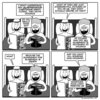Will Science Drive Religion Extinct?
Will Science Drive Religion Extinct? | RealClearScience
Religion is declining in America.
This is actually something fairly new. For decades, religion has been on the wane in developed countries worldwide, with statistical models going so far as to
predict its eventual extinction in nine countries: Australia, Austria, Canada, the Czech Republic, Finland, Ireland, the Netherlands, New Zealand and Switzerland. America was pretty much the sole country bucking the trend to nonbelief. No longer.
In 1998, 62 percent of Americans said they were “moderately” or “very” religious. In 2014, that number dropped to 54 percent. According to a
recent study, irreligion is particularly pronounced amongst younger Americans.
"Nearly a third of Millennials were secular not merely in religious affiliation but also in belief in God, religiosity, and religious service attendance, many more than Boomers and Generation X’ers at the same age," the authors wrote. "Eight times more 18- to 29-year-olds never prayed in 2014 versus the early 1980s."
In light of the new data, it seems inevitable that as demographics change over a matter of decades, religious practitioners will become a minority group in the United States. What's driving the decline?
While a variety of factors are likely at play, I'd like to focus on what may be the most significant contributor: science.
We are perhaps the first generation of humans to http://www.thethinkingatheist.com/forum/Thread-Science-Based-Religion a factually accurate understanding of our world and ourselves. In the past, this knowledge was only in the hands and minds of the few, but with the advent of the Internet, evidence and information have never been so widespread and accessible. Beliefs can be challenged with the click of a button. We no longer live in closed, insular environments where a single dogmatic worldview can dominate.
As scientific evidence questions the tenets of religion, so too, does it provide a worldview to follow, one that's infinitely more coherent.
Sir James George Frazer, often considered one of the founding fathers of modern anthropology,
wrote that -- when stripped down to the core -- religion, science, and magic are similar conceptions, providing a framework for how the world works and guiding our actions. He also noted that humanity moved through an Age of Magic before entering an Age of Religion. Is an Age of Science finally taking hold?
Bemidji State University psychology professor Nigel Barber
expounds upon Frazer's thoughts even further.
"[He] proposed that scientific prediction and control of nature supplants religion as a means of controlling uncertainty in our lives. This hunch is supported by data showing that more educated countries have higher levels of non belief and there are strong correlations between atheism and intelligence."
Frazer's hunch is also supported by a
recent study published journal
Personality and Individual Differences. Querying 1,500 Dutch citizens, a team of researchers led by Dr. Olga Stavrova of the University of Cologne found that belief in scientific-technological progress was positively associated with life satisfaction. This association was significantly larger than the link between religion and life satisfaction. Moreover, using the
World Values Survey, they extrapolated their findings worldwide. As
Ronald Bailey reported in
Reason:
Stavrova and company concluded that the "correlation between a belief in scientific–technological progress and life satisfaction was positive and significant in 69 of the 72 countries." On the other hand, the relationship between religiosity and life satisfaction was positive in only 28 countries and actually negative in 5 countries.
"Believing that science is or will prospectively grant... mastery of nature imbues individuals with the belief that they are in control of their lives," Stavrova concluded.
So not only does science dispel religious belief, it also serves as an effective substitute for it. Science will never drive religion completely extinct, but religion may be marginalized to a small minority bereft of influence.
One of science's primary aims is to seek out knowledge that will hopefully better our world and the lives of all who live on it. That's something we all can believe in.





